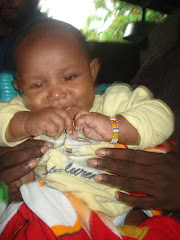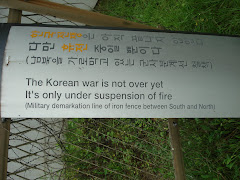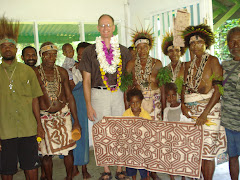Tuesday, May 3, 2016
Catch up
During my time in the Solomon Islands I led a workshop for the brothers on Franciscan leadership, using a wonderful book "Leading Like Francis."
We met under a huge mango tree outside the friary at Hautambu. The workshop include conversation and role playing. Working with these 50 young men was a real highlight of my visit this year.
After the workshop we met for chapter. Here we are after the last session: still smiling...
Every year I try to visit the friaries, this year i made it to all 9 friaries in the province. I travelled by ship, truck, on foot--once I had to swim a flooded river Indiana Jones style, and here we are launching the new canoe with outboard motor. We are on the beach after a three day visit to the new friary on Ysabel Island. The terrific paint job in the colors of the Solomon Islands flag caused a lot of comment!
We met under a huge mango tree outside the friary at Hautambu. The workshop include conversation and role playing. Working with these 50 young men was a real highlight of my visit this year.
After the workshop we met for chapter. Here we are after the last session: still smiling...
Every year I try to visit the friaries, this year i made it to all 9 friaries in the province. I travelled by ship, truck, on foot--once I had to swim a flooded river Indiana Jones style, and here we are launching the new canoe with outboard motor. We are on the beach after a three day visit to the new friary on Ysabel Island. The terrific paint job in the colors of the Solomon Islands flag caused a lot of comment!
Sunday, January 17, 2016
God's Gift to the Church
There is a great deal of hurt in the Episcopal Church about Anglican Communion's implementation of "consequences" in reaction to the full inclusion of gay, lesbian, bisexual and transgender people in the church. The decision that the Episcopal Church needs to step back from full participation for three years hurts. But the Presiding Bishop of the Episcopal Church, Michael Curry has articulated the heart of the matter: "Our commitment to be an inclusive church is not based on a social theory or capitulation to the ways of the culture, but on our belief that the outstretched arms of Jesus on the cross are a sign of the very love of God reaching out to us all."
These are powerful words and they reflect the reality of the church's position. It is a position taken in love. I believe in time there will be a reconciliation, the challenge will be to reach out, as another friend Barbara Crafton reminded us with the word of Abraham Lincoln: "with malice towards none..."
In the midst of this highly emotional week, I read "The Extraordinary Heart" by Nicholas Benton. As a gay man I was feeling a bit defensive about my identity and was wondering how to "give back" to the Church which has taken such a risk for me and many others like me. Benton writes about gay identity and giftedness:
"There is a "third way," alluded to in everything I have written in this series about nature's role for homosexuals in the creative order. It embodies all the attributes I have derived from the homosexual experience, outside of sexuality per se, such as a gay "sensibility," including a heightened empathy, an alternative sensual perspective, and a constructive non-conformity.
In the context of Greek mythological archetypes, it is identified with the mythological role of Prometheus.
Prometheus! Who would have thought of him in association with homosexual identity?
That's the nature of our gay revolution, to call into being something new, a new idea, and thereby to redefine ourselves and, thus, the world around us.
The myth of Prometheus fits. He was the Titan deity who stole fire from Zeus and gave it to mortals, a great champion of mankind that the fifth-century B.C. playwright Aeschylus, who in his Prometheus Bound credits him with also providing mankind the arts of civilization, including science, math, agriculture, writing and medicine. His gift of divine fire symbolizes the spirit of creativity and constructive revolution, of humanity's liberation to reach its full potential."
It is an extraordinary book, and I found it especially helpful because he doesn't base homosexual identity on sex acts but on the precocious creative potential, the desire to live differently in the world, free from the straight jacket of nine-to-five job, a mortgage etc., the deep empathy for the poor, sick and outcast. My celibate commitment fits very comfortably in this generous definition of gay identity. Instead of feeling handicapped or diminished by my calling, Benton has helped me to see that all of the things that I cite as evidence of my Franciscan calling are deeply organic to who I am as a gay man. Becoming a friar wasn't hiding but assuming the responsibilities necessary for my full acceptance of who I was created to be, the calling I have received through God's grace. I gave an interview to a man in 1992 who was writing an article about the spirituality of gay men, and when he asked why I was so drawn to work with homeless people, I said it grew out of my empathy for them, a sense of being and having overcome homelessness myself as a gay boy. I was never actually homeless, but the feeling you don't fit is a very close second...
So now is the time for gay people in the Episcopal Church, lay and ordained, to be ourselves with all the clarity, passion and creativity we can muster. To embrace our promethean archetype and empower our several vocations to bring the church and civilization to a place of deeper integration with the vision of God's reign among us, with malice towards none...
These are powerful words and they reflect the reality of the church's position. It is a position taken in love. I believe in time there will be a reconciliation, the challenge will be to reach out, as another friend Barbara Crafton reminded us with the word of Abraham Lincoln: "with malice towards none..."
In the midst of this highly emotional week, I read "The Extraordinary Heart" by Nicholas Benton. As a gay man I was feeling a bit defensive about my identity and was wondering how to "give back" to the Church which has taken such a risk for me and many others like me. Benton writes about gay identity and giftedness:
"There is a "third way," alluded to in everything I have written in this series about nature's role for homosexuals in the creative order. It embodies all the attributes I have derived from the homosexual experience, outside of sexuality per se, such as a gay "sensibility," including a heightened empathy, an alternative sensual perspective, and a constructive non-conformity.
In the context of Greek mythological archetypes, it is identified with the mythological role of Prometheus.
Prometheus! Who would have thought of him in association with homosexual identity?
That's the nature of our gay revolution, to call into being something new, a new idea, and thereby to redefine ourselves and, thus, the world around us.
The myth of Prometheus fits. He was the Titan deity who stole fire from Zeus and gave it to mortals, a great champion of mankind that the fifth-century B.C. playwright Aeschylus, who in his Prometheus Bound credits him with also providing mankind the arts of civilization, including science, math, agriculture, writing and medicine. His gift of divine fire symbolizes the spirit of creativity and constructive revolution, of humanity's liberation to reach its full potential."
It is an extraordinary book, and I found it especially helpful because he doesn't base homosexual identity on sex acts but on the precocious creative potential, the desire to live differently in the world, free from the straight jacket of nine-to-five job, a mortgage etc., the deep empathy for the poor, sick and outcast. My celibate commitment fits very comfortably in this generous definition of gay identity. Instead of feeling handicapped or diminished by my calling, Benton has helped me to see that all of the things that I cite as evidence of my Franciscan calling are deeply organic to who I am as a gay man. Becoming a friar wasn't hiding but assuming the responsibilities necessary for my full acceptance of who I was created to be, the calling I have received through God's grace. I gave an interview to a man in 1992 who was writing an article about the spirituality of gay men, and when he asked why I was so drawn to work with homeless people, I said it grew out of my empathy for them, a sense of being and having overcome homelessness myself as a gay boy. I was never actually homeless, but the feeling you don't fit is a very close second...
So now is the time for gay people in the Episcopal Church, lay and ordained, to be ourselves with all the clarity, passion and creativity we can muster. To embrace our promethean archetype and empower our several vocations to bring the church and civilization to a place of deeper integration with the vision of God's reign among us, with malice towards none...
Subscribe to:
Comments (Atom)








